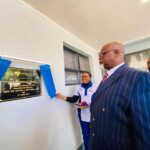Dr. Caleb Fundanga is a prominent economist and the former Governor of the Bank of Zambia, recognized for his contributions to economic policy and development in Zambia and beyond. Here are 20 essential facts about his life, career, and impact on the economic landscape.
- Early Life and Education: Dr. Fundanga was born in Zambia and pursued his undergraduate studies in economics at the University of Zambia.
- Advanced Degrees: He furthered his education by earning a Master’s degree in Economics from the University of Illinois at Urbana-Champaign and a Ph.D. in Economics from the University of Zambia.
- Academic Career: Before joining the Bank of Zambia, Fundanga served as a lecturer at the University of Zambia, where he taught economics and influenced many students.
- Governor of the Bank of Zambia: Dr. Fundanga served as the Governor of the Bank of Zambia from 2002 to 2011, a period marked by significant economic reforms and stabilization efforts.
- Economic Policy Reforms: As Governor, he played a crucial role in implementing monetary policy reforms aimed at controlling inflation and stabilizing the Zambian currency.
- Promoting Financial Inclusion: Fundanga was a strong advocate for financial inclusion, promoting initiatives to expand access to financial services for underserved populations in Zambia.
- Inflation Control: Under his leadership, the Bank of Zambia implemented policies that significantly reduced inflation rates, contributing to economic stability.
- Zambian Kwacha Stabilization: Fundanga’s tenure saw efforts to stabilize the Zambian kwacha, working towards creating a more resilient currency.
- Advocacy for Economic Diversification: He emphasized the importance of diversifying the Zambian economy beyond copper mining to ensure sustainable growth.
- Public Speaking: Dr. Fundanga is a respected public speaker, often invited to address economic forums and conferences both locally and internationally.
- Research Contributions: He has conducted extensive research on various economic issues, including monetary policy, exchange rates, and economic development in Zambia.
- Role in International Organizations: Fundanga has served in various capacities with international organizations, including the International Monetary Fund (IMF) and the African Development Bank (AfDB).
- Consultancy Work: After his tenure at the Bank of Zambia, he engaged in consultancy work, advising governments and institutions on economic policy and development strategies.
- Advocate for Good Governance: Fundanga has consistently advocated for good governance and accountability in economic management, stressing their importance for sustainable development.
- Impact on Financial Sector Development: He played a key role in enhancing the regulatory framework for Zambia’s financial sector, contributing to its growth and stability.
- Media Contributions: Dr. Fundanga regularly contributes to discussions in the media on economic issues, offering insights on policy matters and economic trends.
- Commitment to Education: He remains committed to education, often mentoring young economists and participating in initiatives aimed at improving economic literacy in Zambia.
- Honorary Awards: Fundanga has received several honorary awards and recognitions for his contributions to economics and public service.
- Philosophy on Development: His economic philosophy emphasizes the importance of building strong institutions and policies that promote inclusive growth and poverty reduction.
- Legacy: Dr. Caleb Fundanga’s contributions to Zambia’s economic policy landscape have had a lasting impact, making him a respected figure in the field of economics and a role model for future generations of economists.
Dr. Caleb Fundanga continues to be a significant voice in the discourse on economic development in Zambia, advocating for policies that promote stability, growth, and inclusivity in the economy. His expertise and commitment to public service make him a key figure in shaping the future of Zambia’s economic landscape.






